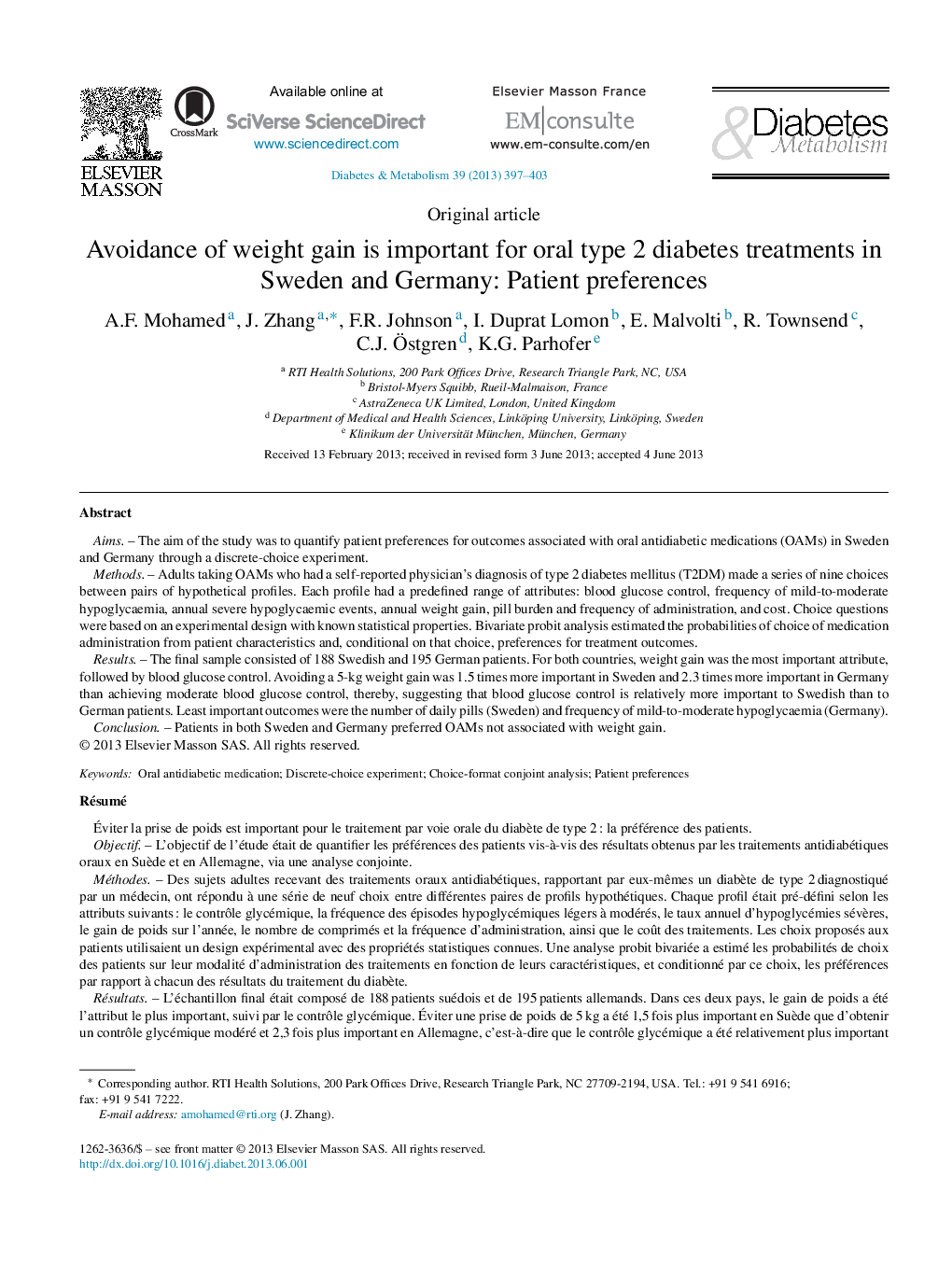| کد مقاله | کد نشریه | سال انتشار | مقاله انگلیسی | نسخه تمام متن |
|---|---|---|---|---|
| 3259789 | 1207587 | 2013 | 7 صفحه PDF | دانلود رایگان |

AimsThe aim of the study was to quantify patient preferences for outcomes associated with oral antidiabetic medications (OAMs) in Sweden and Germany through a discrete-choice experiment.MethodsAdults taking OAMs who had a self-reported physician's diagnosis of type 2 diabetes mellitus (T2DM) made a series of nine choices between pairs of hypothetical profiles. Each profile had a predefined range of attributes: blood glucose control, frequency of mild-to-moderate hypoglycaemia, annual severe hypoglycaemic events, annual weight gain, pill burden and frequency of administration, and cost. Choice questions were based on an experimental design with known statistical properties. Bivariate probit analysis estimated the probabilities of choice of medication administration from patient characteristics and, conditional on that choice, preferences for treatment outcomes.ResultsThe final sample consisted of 188 Swedish and 195 German patients. For both countries, weight gain was the most important attribute, followed by blood glucose control. Avoiding a 5-kg weight gain was 1.5 times more important in Sweden and 2.3 times more important in Germany than achieving moderate blood glucose control, thereby, suggesting that blood glucose control is relatively more important to Swedish than to German patients. Least important outcomes were the number of daily pills (Sweden) and frequency of mild-to-moderate hypoglycaemia (Germany).ConclusionPatients in both Sweden and Germany preferred OAMs not associated with weight gain.
RésuméObjectifL’objectif de l’étude était de quantifier les préférences des patients vis-à-vis des résultats obtenus par les traitements antidiabétiques oraux en Suède et en Allemagne, via une analyse conjointe.MéthodesDes sujets adultes recevant des traitements oraux antidiabétiques, rapportant par eux-mêmes un diabète de type 2 diagnostiqué par un médecin, ont répondu à une série de neuf choix entre différentes paires de profils hypothétiques. Chaque profil était pré-défini selon les attributs suivants : le contrôle glycémique, la fréquence des épisodes hypoglycémiques légers à modérés, le taux annuel d’hypoglycémies sévères, le gain de poids sur l’année, le nombre de comprimés et la fréquence d’administration, ainsi que le coût des traitements. Les choix proposés aux patients utilisaient un design expérimental avec des propriétés statistiques connues. Une analyse probit bivariée a estimé les probabilités de choix des patients sur leur modalité d’administration des traitements en fonction de leurs caractéristiques, et conditionné par ce choix, les préférences par rapport à chacun des résultats du traitement du diabète.RésultatsL’échantillon final était composé de 188 patients suédois et de 195 patients allemands. Dans ces deux pays, le gain de poids a été l’attribut le plus important, suivi par le contrôle glycémique. Éviter une prise de poids de 5 kg a été 1,5 fois plus important en Suède que d’obtenir un contrôle glycémique modéré et 2,3 fois plus important en Allemagne, c’est-à-dire que le contrôle glycémique a été relativement plus important pour les patients suédois que pour les patients allemands. Le nombre de comprimés par jour a été moins important pour les patients suédois ainsi que la fréquence des épisodes hypoglycémiques légers à modérés pour les sujets allemands.ConclusionLes patients en Suède et en Allemagne préfèrent les traitements antidiabétiques oraux qui ne produisent pas de prise de poids.
Journal: Diabetes & Metabolism - Volume 39, Issue 5, October 2013, Pages 397–403